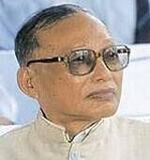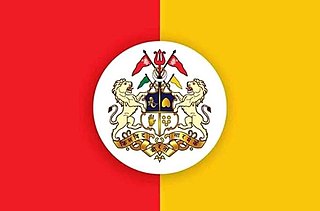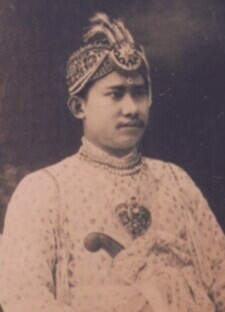
Tripura is a state in Northeast India. The third-smallest state in the country, it covers 10,491 km2 (4,051 sq mi); and the seventh-least populous state with a population of 3.67 million. It is bordered by Assam and Mizoram to the east and by Bangladesh to the north, south and west. Tripura is divided into 8 districts and 23 sub-divisions, where Agartala is the capital and the largest city in the state. Tripura has 19 different tribal communities with a majority Bengali population. Bengali, English and Kokborok are the state's official languages.

Agartala is the capital and the largest city of the Indian state of Tripura, situated on the banks of Haora/Saidra River, about 2 kilometres (1.2 mi) east of the border with Bangladesh and about 2,499 km (1,552 mi) from the national capital, New Delhi. According to 2022 AMC data, Agartala is the second most populous city after Guwahati in Northeast India. It is India's third international internet gateway and being developed under the Smart Cities Mission.

Kokborok (or Tripuri) is a Tibeto-Burman language of the Indian state of Tripura and neighbouring areas of Bangladesh. Its name comes from kok meaning "verbal" and borok meaning "people" or "human", It is one of the ancient languages of Northeast India.

Dasarth Debbarma was an Indian Communist politician in the Indian state of Tripura. He was chief minister of Tripura from 1993 to 1998. He was a leader of the Ganamukti Parishad and the Communist Party of India (Marxist). He was also the vice-president of All India Kisan Sabha and first and yet only Tiprasa chief minister of Tripura.

The Tripura Baptist Christian Union (TBCU) is a Baptist Christian denomination in Tripura, India. It has its head office in Agartala, the state capital. The TBCU is affiliated to the Asia Pacific Baptist Federation (APBF) and the Baptist World Alliance (BWA). It is also a member church in the North East India Christian Council (NEICC), a regional church body of the National Council of Churches in India (NCCI).
Khumulwng is a town in the West Tripura district in the Indian state of Tripura. It is the headquarters and the largest town of the Tripura Tribal Areas Autonomous District Council.

The Tripuri are a Tibeto-Burman-speaking ethnic group of Northeast Indian state of Tripura. They are the descendants of the inhabitants of the Twipra/Tripura Kingdom in North-East India and Bangladesh. The Tripuri people through the Manikya dynasty ruled the Kingdom of Tripura for over 600 years starting from 1400 A.D. until the kingdom joined the Indian Union on 15 October 1949. The Tipra Dynasty was established in 590 AD.

Jatra is a popular folk-theatre form Bengali theatre, spread throughout most of Bengali speaking areas of the Indian subcontinent, including Bangladesh and Indian states of West Bengal, Assam, Odisha and Tripura As of 2005, there were some 55 troupes based in Calcutta's old Jatra district, Chitpur Road, and all together, jatra is a $21m-a-year industry, performed on nearly 4,000 stages in West Bengal alone, where in 2001, over 300 companies employed over 20,000 people, more than the local film industry and urban theatre.

Kokborok (Tiprakok/Tripuri) is the native language of Tripuri people in present Tripura state in Northeast of India. During the 20th century many of Royal family and its officials contributes to develop the Kokborok language in many ways.

Debbarma is the main clan of Tripuri community, predominantly in state of Tripura, India and Bangladesh who speak Kokborok, a Tibeto-Burman language.

Pradyot Manikya Deb Barma is the current titular King (Maharaja) and statesman from Tripura. He was born in New Delhi, and now resides in Agartala, Tripura. He also served as the editor of TNT-The Northeast Today. He is the current chairman of The Indigenous Progressive Regional Alliance also known as TIPRA Motha. He is known as 'Bubagra' among his people and is one of the active voices for the rights of Indigenous Tripuri people of Tripura.

Birendra Kishore Manikya Debbarma Bahadur ascended the throne of the Kingdom of Tripura on 25 November 1909, at the age of 26.

Tripura State, also known as Hill Tipperah, was a princely state in India during the period of the British Raj and for some two years after the departure of the British. Its rulers belonged to the Manikya dynasty and until August 1947 the state was in a subsidiary alliance, from which it was released by the Indian Independence Act 1947. The state acceded to the newly independent Indian Union on 13 August 1947, and subsequently merged into the Indian Union in October 1949.
Mathia is a 2004 Indian Kokborok-language full-length feature film. It is written and directed by Joseph Pulinthanath and stars Meena Debbarma, Jayanta Jamatia and Amulya Jamaita.
Sudhanwa Debbarma was an Indian Kokborok writer, Political leader and member of the Communist Party of India (Marxist). He was the former Speaker of Tripura Legislative Assembly. He was the veteran leader of Ganamukti Parishad. He was a member of Tripura Legislative Assembly from Takarjala (1977-1988).

Nanda Kumar Deb Barma is a Tipra playwright, poet, and lyricist from Tripura. He is known for literature in Kokborok language and Kokborok Drama. Nanda Kumar Deb Barma is author of novels such as Rung (2001), and compilations of works such as Thungnuk Bwchap (2015). He has been one of the active advocates for Kokborok development of literature and education and is the president of Kokborok Sahitya Sabha.

Kokborok Cinema refers to the Kokborok language film industry in Tripura, India and among the Tripuri people. Tripura's Kokborok film industry began in 1986 with Longtharai (1986) directed by Dipak Bhattacharya adapted from Bimal Sinha's novel Karachi theke Longtharai depicting the struggle-ridden life of jhum cultivators in the rural hills of Longtharai followed by the Kokborok film Langmani Haduk (1993) directed by Ruhi Debbarma can be read as a critique of the modern regime. The Kokborok film Mathia (2004) directed by Joseph Pulinthanath, is the first International Award-winning Kokborok film.
Yarwng is a 2008 Kokborok feature film produced by Don Bosco Sampari Pictures Tripura, written and directed by Joseph Pulinthanath. The story of the 95-minute feature film revolves round the large-scale displacement which happened in Tripura state, in northeast India, when the newly built Dumbur dam (1970s) submerged huge areas of arable land in the fertile Raima valley about 40 years ago. The film won the first national film award for Tripura at the 56th National Film Awards in (2008)
The National School of Drama, New Delhi, has established its camp office National School of Drama Theatre-in-Education Wing Tripura in conjunction with the Department of Information & Cultural Affairs and Higher Education, Government of Tripura, in Agartala, with effect from 17 November 2011. The wing provides a one-year residential PG certificate course in Theatre-in-Education to students from the Northeast, the rest of India, and around the world.












